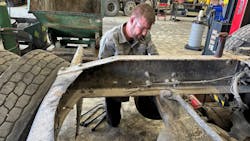Focus on interviews, flexibility keep techs in the shop indie owners say
For independent shops, flexibility can often be key to success, whether in advertising for jobs, scheduling technicians, or crafting pay structures. CEO Patrick McKittrick and VP of Product Scott Gordon for Fullbay, a shop maintenace management platform, delved into this topic in a webinar on Oct. 8, 2024, with Evan Lang, owner of E.L.M. Repair and Refrigeration, a heavy-duty repair shop based in Wisconsin, and Will Hendrickson, president of Black Stack Mechanical, a heavy-duty shop that does a lot of oil field vehicle work located in Red Deer, Alberta.
While E.L.M. is a bit bigger than Black Stack Mechanical, with 21 technicians and a shop of 33,000 sq. ft. compared to Black Stack’s 21,000 sq. ft. and four technicians, both have benefitted from flexibility in management, especially in finding and keeping good technicians.
According to Hendrickson, finding a good, skilled technician is still difficult, as “just getting the resumes into the inbox is a struggle,” he noted, adding this means the shop has "to get creative in how we advertise the position.”
This includes highlighting how to make the shop itself attractive to technicians, especially if they’ll be living away from their families to work on the oil field vehicles Black Stack Mechanical sometimes covers. Lang also talks up the amenities in the climate-controlled shop, including equipment such as lifts, a Dino Bay wash bay, and ergonomic equipment.
“We're investing some money in infrastructure and tooling to try to make it easier on their bodies,” Lang commented.
But with all that investment, how do Lang and Hendrickson make sure the technicians they hire are up to snuff?
For Hendrickson, training and an employee’s response to that training is key. He tends to work with his vendors and manufacturers to set up online training and then watches how enthusiastic and entrepreneurial his new hire is.
"That seemed to reciprocate really well with the employees and piqued a lot of interest in furthering their career,” Hendrickson explained. “Especially for the guys that want to be the engine technician or the diagnostics guy.”
Lang, meanwhile, takes a social approach to vetting his potential hires. In particular, he tends to check in with tool vendors who travel from shop to shop to see what they’ve noticed about a technician’s demeanor, production, and attitude. Of course, this is dependent on the technician in question being a local.
“But if it's an outsider from farther away, we try to ask the key questions,” Lang said. “And we like to do a working interview, at least for a day.”
Then, if the technician’s skills seem to be lacking at the end of the working interview but shows a strong attitude and willingness to learn, Lang will also help connect the technician with the training they need to succeed.
Flexible scheduling
But being ready to invest in a new employee isn’t the only way Lang makes sure his operation stays adaptable. E.L.M.’s hours tend to run from 7 a.m. to midnight, providing a lot of flexibility for its customers and multiple shifts for its technicians.
“We don't just run a seven to 3:30 p.m and a 3:30 p.m. to midnight,” Lang clarified. “We have guys that come in at six. We have guys that come in at seven, 7:30, 8, 11 [in the morning] and then the last shift generally comes in around 2 p.m., but some will come in at 1 p.m. to get a few extra hours in.”
But in return for the long hours, E.L.M. is generally closed on the weekends and provides differential pay for the second-shift workers. Even for the day shift, Lang still provides flexible scheduling for his technicians.
“We will let [our techs] pick their hours,” Lang explained. “Not daily, but if they have a life-changing event, then we can change it from, ‘Hey, I came in at six, now it's eight so I can get the kids on the bus.’”
Read more: Stop the revolving door: How retention strategies drive fleet ROI
Black Stack Mechanical, meanwhile, provides more standard hours from about 8 to 4:30 p.m. with a half-hour lunch break, but they do offer weekend coverage for fleets and overtime pay for technicians. This is where Hendrickson found he needed to be flexible. Instead of establishing a rotating shift for weekend coverage, he found it easier to set up an on-call schedule.
“If there's a customer that really needs something done, and if it's scheduled, I find it’s a lot easier to ask a technician beforehand to work the weekend versus if a customer calls at 9:30 on Saturday morning and you have to say, ‘Hey, can you come in?’” Hendrickson said.
Incentives and compensation
Both shop owners also found that being able to adapt their compensation and bonuses to different structures and employees tended to make them more effective.
“I found was that there is no one way to incentivize a technician to bring up their efficiency,” Hendrickson emphasized, even if that meant forgoing financial incentives in favor of other tactics.
“You have to really get to know your employees and find what their motivating factors are and go off of that because we live in a different day and age now where money isn't the end-all way to motivating people,” he continued. For instance, at Black Stack Mechanical, Hendrickson said that a couple of his technicians were hunters, so a bit of extra time off in November mattered more to them than a bonus.
That isn’t to say that efficiency bonuses haven’t been helpful to Hendrickson either, as he runs a bonus program based on efficiency thresholds, where each technician is compensated based on 75%, 85%, and over 100% based on rates he pulls from Fullbay. He tends to offer these bonuses each month and lets technicians know how they’re doing in between so that they know when they need to improve.
“And I definitely saw my key technicians improve substantially, just from them being able to track that over time,” Hendrickson said.
Lang agreed that for many of his technicians, time off is often a stronger incentive than greater pay.
“[For] some people it is money, but a larger percentage it is not,” Lang noted. “It might be more time with family. Or can I get off this date because I have some stuff with my kids?”
But even with relatively standard bonuses, Lang found he needed to adapt his practices over time. For example, E.L.M. typically offers technicians a yearly Christmas bonus, which worked well – for a time.
“But it seems like in the last five to seven to 10 years, you can't put the carrot out that far,” Lang explained. “It seems like if you're not in the three to four weeks, they lose sight of the carrot.”
Now, while Lang still offers the Christmas bonus, he also offers monthly bonuses, which are based on both individual and shop performance. He mirrors this flexible attitude in his standard compensation packages, too, by allowing his technicians to choose whether they’re paid a flat rate or hourly. And he doesn’t require that a technician remain locked into his chosen compensation method for his entire career at E.L.M., either.
“I've given them options over the years, I’ve said ‘Hey, I think you're ready to go flat rate, I think you could do better on it,’” Lang said. Additionally, if a technician is starting a family or they’re getting older and need some security, he’ll allow them to switch back to hourly rates as well.
About the Author

Alex Keenan
Alex Keenan is an Associate Editor for Fleet Maintenance magazine. She has written on a variety of topics for the past several years and recently joined the transportation industry, reviewing content covering technician challenges and breaking industry news. She holds a bachelor's degree in English from Colorado State University in Fort Collins, Colorado.
